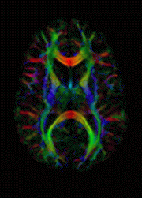
Photo from wikipedia
Multi‐shot techniques offer improved resolution and signal‐to‐noise ratio for diffusion‐ weighted imaging, but make the acquisition vulnerable to shot‐specific phase variations and inter‐shot macroscopic motion. Several model‐based reconstruction approaches with… Click to show full abstract
Multi‐shot techniques offer improved resolution and signal‐to‐noise ratio for diffusion‐ weighted imaging, but make the acquisition vulnerable to shot‐specific phase variations and inter‐shot macroscopic motion. Several model‐based reconstruction approaches with iterative phase correction have been proposed, but robust macroscopic motion estimation is still challenging. Segmented diffusion imaging with iterative motion‐corrected reconstruction (SEDIMENT) uses iteratively refined data‐driven shot navigators based on sensitivity encoding to cure phase and rigid in‐plane motion artifacts. The iterative scheme is compared in simulations and in vivo with a non‐iterative reference algorithm for echo‐planar imaging with up to sixfold segmentation. The SEDIMENT framework supports partial Fourier acquisitions and furthermore includes options for data rejection and learning‐based modules to improve robustness and convergence.
Journal Title: NMR in Biomedicine
Year Published: 2019
Link to full text (if available)
Share on Social Media: Sign Up to like & get
recommendations!